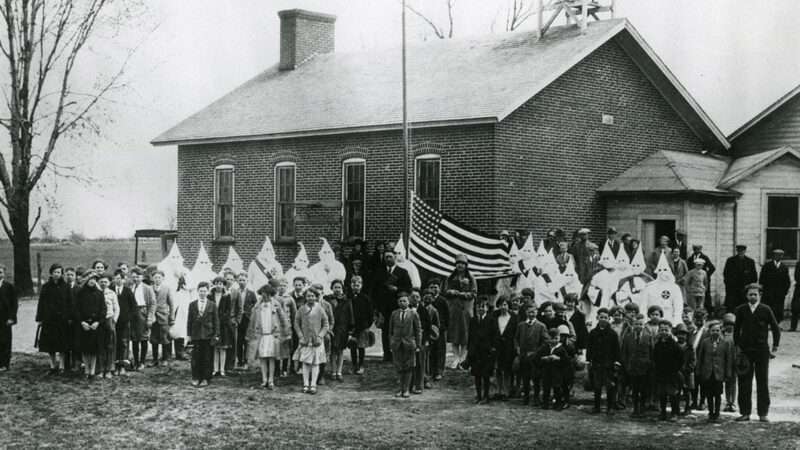
"The greatest duty of America today is to build up our educational system." That sentiment probably seems anodyne, like something you might have heard on the campaign trail in the recently concluded midterms. A century ago, it represented the top priority of the Ku Klux Klan.
"Throughout the boom years of the early 1920s," the historian Adam Laats notes in a 2012 History of Education Quarterly article, "every local Klan group made education reform a leading goal of its public activism." Eventually, Laats writes, a push for compulsory public schooling overseen by a federal cabinet agency became the "linchpin" of the organization's agenda.
Why the Klan's sudden interest in education policy? First and foremost, because of the KKK's virulent nativism and anti-Catholicism. Most private schools at the time were associated with the Catholic Church, while most public schools were openly, if unofficially, Protestant. By requiring all children to attend the latter institutions, Klan members thought they could strip Catholic parishes of an income source, reduce the Catholic hierarchy's ability to indoctrinate the next generation, and secure their own right to inculcate values instead.
The effort to shutter parochial institutions altogether would soon be halted. In 1922, Oregon passed a law requiring every child to attend a local public school. Supporters including the KKK admitted the aim was to drive all private schools in the state out of business. But before the law went into effect, the U.S. Supreme Court deemed it unconstitutional.
Undeterred, the Klan continued pursuing its education agenda in the public sphere. Members bullied Catholic teachers and principals into vacating public school jobs. They made donations of (Protestant) Bibles and agitated for mandatory (Protestant) prayer and religion classes. And they lined up behind the National Education Association (NEA), the country's largest teachers union, as it lobbied over more than a decade for the establishment of a federal Department of Education.
The groups wanted an Education Department that would provide funding to schools across the country, thereby promoting literacy and patriotism. An influx of immigrants had raised concerns that pockets of the country were not being assimilated into the American way of life. Compulsory education was meant to build national unity, ensuring the country's future workers could speak the same language and preparing them to be productive members of society.
Supporters of this effort often portrayed it as a grand humanitarian crusade. "We must have a compulsory education system to reach and uplift every future citizen," national Ku Klux Klan leader Hiram Evans said in 1924. If the campaign was successful, "all our humanity might live in harmony."
The cruelly coercive nature of the proposals nevertheless was apparent. "We will be a homogeneous people," Evans told a friendly audience in 1923. "We will grind out Americans like meat out of a grinder." Or as an early Progressive education reformer chillingly put it in 1902, "The nation has a right to demand intelligence and virtue of every citizen, and to obtain these by force if necessary."
As the NEA and KKK pushed to federalize education funding, they met opposition from Catholic institutions. The National Catholic Welfare Council, a U.S. body of Catholic bishops and staff, worked diligently to oppose bills that would have elevated an Interior Department bureau collecting education statistics into its own cabinet agency. America, a Jesuit magazine, editorialized against the legislative proposals as well. Fearing that federal funding of education would lead to federal control of education, Catholic leaders argued that parents must be allowed to determine what kind of schooling was right for their kids.
History was on the Catholics' side. Education in America had always been a state and local issue. Although the Founders "wanted a nation of virtuous, informed citizens," wrote Kevin Kosar, then of the R Street Institute, in 2015, "almost nobody saw educating them as the federal government's job. The Constitution didn't authorize the federal government to make schools policy."
In the 1920s and '30s, opponents were successful at preventing the establishment of a standalone cabinet agency. But the push for a centralized education authority didn't go away even when the Klan did. Lawmakers in Washington began appropriating school funding in the decades that followed, and a federal Department of Education was officially created in 1979.
The post The KKK's Push for Compulsory Schooling and a Federal Education Department appeared first on Reason.com.







